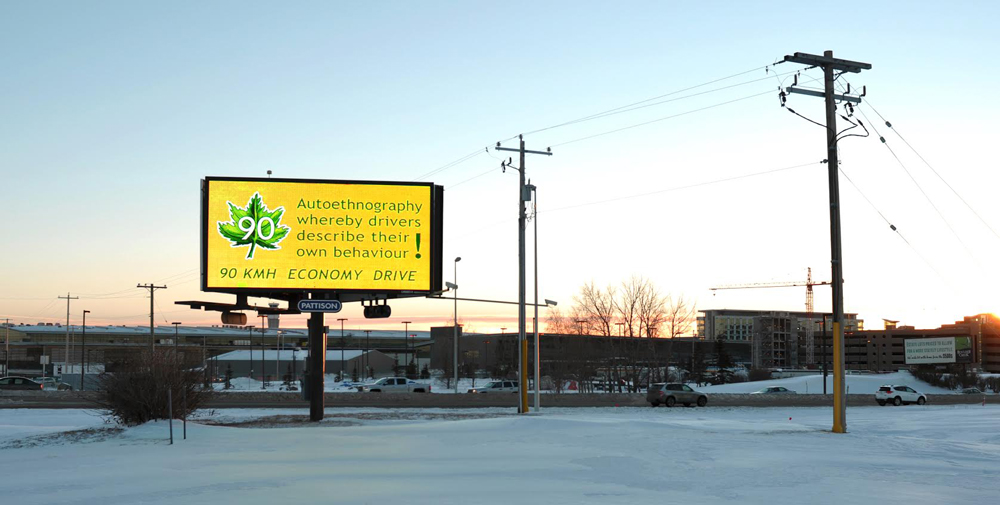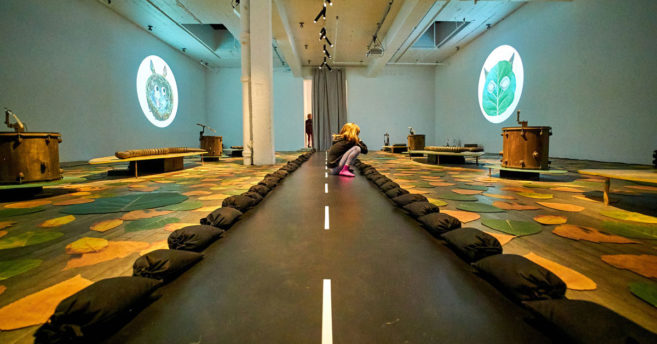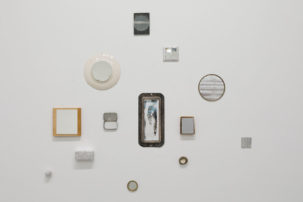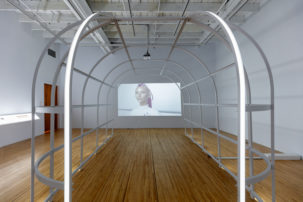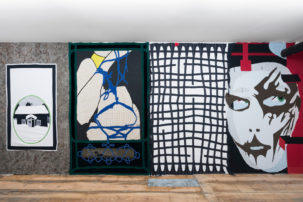American novelist Ayn Rand’s 1957 dystopic tome, Atlas Shrugged, argues for the natural supremacy of individualism, reason and capitalism, values that would subsequently inform her philosophical theory of Objectivism. Rand might have liked today’s Alberta: the province where I was born and continue to live is increasingly brash and self-centered, driven by libertarian and neoliberal values. Alberta’s recent provincial budget once again privileges corporate profits over sustainable, affordable education and health care; environmental protections are sacrificed for short-term economic growth; and the lowest corporate tax rates in the country are protected while citizens are nickle-and-dimed to death with user fees. And, need I mention, there are more cuts to the arts. Alberta’s conservative politicians could very well be writing the epilogue to Rand’s Atlas Shrugged.
“Atlas Sighed,” artist and writer Steven Cottingham’s second iteration of the Calgary Biennial, hints at a level of resignation and exhaustion given the current political and social situation in Alberta. Yet it is not without hope. Optimism, or at least a yearning for something better, is at the core of this collection of 15 diverse contemporary-art projects by artists who use guerrilla tactics to, in Cottingham’s words, “appropriate commercial vernaculars of the urban landscape in order to challenge conservative status quos.” Since December, projects have infiltrated Calgary’s urban landscape on billboards, bus shelters and telephone poles; circulated in newspapers and on cell phones; and been documented and accompanied by irreverent but sincere parallel visual and fictive texts in the equally ephemeral forms of a website and newspaper broadsheets. Save a few, the artists are under 40 and have spent their time in Alberta under conservative rule, suffering boom-bust economies.
When one is so enshrined in a singular ideology, imagining something other than one’s own complicity is a creative act itself; “it is risky and exhausting too,” Atlas sighed. Perhaps this is why, in tone, Cottingham’s project statement and many of the artist’s art/essays/interviews, read like a manifesto countering a complacent, conservative democracy. Belgian political theorist Chantal Mouffe argues that resistance and productive conflict are essential to a functioning democracy, and “Atlas Sighed” enacts this agonistic democracy in Calgary’s public spaces and its citizens’ imaginations.
Most of the projects question who constitutes, and what defines, communities in Calgary. Queering the city’s dominant identity and power structure, be it through questioning class, race, gender and/or sexual orientation is key to the project. The economic imperatives that drive the city’s commercial interests are complicated, in situ, by artists who appropriate and subvert media and public space to share counter-narratives from counter-publics. The vandalism of a work from Steven Beckly’s series, Reunions, in which he enlarged and installed historical photographs of same-sex couples in bus shelters around town, sadly reminds us that it takes very little to disrupt the status quo. Visibility and questions of naming are also key to Brittney Bear Hat’s billboard work Blackfoot, an image of Blackfoot peoples dressed in regalia overlaid with an image of its namesake thoroughfare (which the work, installed on Glenmore Trail, is near). Blackfoot reconsiders the power relations inherent to language and the process of naming: who, she asks, has the right to use these names and for what purposes? Similarly, the bright-pink pseudo-advertisements #girlproblems by Victoria Braun edit together tweets from girls about girls into short poems that address, in part, the filtering of their self-images through media and social media.
Regardless of the potential for social media to connect people in new and challenging ways, it seems more likely that Facebook, Instagram, Twitter, et cetera create what Cottingham calls ideological echo chambers, or highly filtered communities that reflect our own ideological position back to us, thereby negating any possibility for contested, critical discourse. Dan Zimmerman is particularly concerned with the reinforcement of this phenomenon through the process of “liking” on social media platforms. “Liking,” while potentially a democratic process, also reduces everything to quantitative measures. Slacktivist practices, like “liking” or Facebook petitions, where we all preach to each other, should not be confused with agonism and productive protest with others whose opinions differ from our own. Zimmerman’s antidote to this conundrum is LikeBlockr, a free app for mobile phones that we should all try.
Yvonne Mullock and Mia Rushton’s Department of Lost Things also counters consumerism and revalues things qualitatively, perhaps even sentimentally. A beautifully designed newspaper broadsheet, the work documents personal items from public lost and founds in the hope that they will be reunited with their owners. Dick Averns’s 90 kmh Economy Drive, a billboard and bumper-sticker campaign, also encourages drivers to consume less and value environmental concerns as least as much as the time it takes us to get to where we are going. Consume less is trumped by the Ladies Invitational Deadbeat Society’s call to “cease and desist in the face of capitalist overproduction.” Published in a letter to Cottingham and included in the project’s publication, the Ladies assert that they will accept their artists’ fee in exchange for this letter of refusal to participate in “Atlas Sighed.” Furthermore, the Lazy Ladies explain that, to date, their “she-nanigans” have not been enough to shift the exploitative cultural paradigm where everyone is asked to work more for less, so their current practice “necessitates downright refusal as our primary artistic method.”
“Atlas Sighed” also includes a couple of anonymous gestures, one of which is reminiscent of a work by Steven Cottingham included in this year’s Alberta Biennial that writ large in gold leaf the phrase, The future might not be bright enough. Things are going to get worse before they get even worse echoes a similar sentiment and is equally ambiguous. Seemingly without a glimmer of optimism, this paradoxical public-service announcement disseminated around town on appropriated City of Calgary stationery warns of coming trouble, but for whom? The interpretation of this foreboding statement relies solely on the reader’s position, and so, perhaps, does its actualization. Another reminder of this occurred during the last weekend of “Atlas Sighed,” when Sans façon freely distributed red helium balloons in the shape of arrows to the people of Calgary to remind us that we are here and, as long as we are, we have an active role to play as citizens in shaping the place in which we live.

